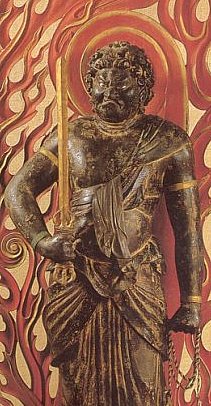Difference between revisions of "Fudô Myôô"
| Line 5: | Line 5: | ||
Purpose and [[Vows]] | Purpose and [[Vows]] | ||
| − | [[Acala]] transmits the teachings and the injunctions of Mahâvairocana to all [[living beings]] and whether they agree to accept or to reject these injunctions is up to them, [[Acala's]] blue/black [[body]] and fierce face [[symbolize]] the force of his will to draw all [[beings]] to follow the [[teachings of the Buddha]]. Nevertheless, [[Acala's]] [[nature]] is [[essentially]] one of [[compassion]] and he has [[vowed]] to be of service to all [[beings]] for {{Wiki|eternity}}. | + | [[Acala]] transmits the teachings and the injunctions of [[Mahâvairocana]] to all [[living beings]] and whether they agree to accept or to reject these injunctions is up to them, [[Acala's]] blue/black [[body]] and fierce face [[symbolize]] the force of his will to draw all [[beings]] to follow the [[teachings of the Buddha]]. Nevertheless, [[Acala's]] [[nature]] is [[essentially]] one of [[compassion]] and he has [[vowed]] to be of service to all [[beings]] for {{Wiki|eternity}}. |
[[Acala]] also represents his aspect of service by having his [[hair]] knotted in the style of a servant: his [[hair]] is tied into seven knots and falls down from his head on the left side. [[Acala]] has two teeth protruding from out of his {{Wiki|mouth}}, an upper tooth and a lower tooth. The upper tooth is pointed downward and this represents his bestowing [[unlimited]] [[compassion]] who are [[suffering]] in [[body]] and [[spirit]]. His lower tooth is pointed upward and this represents the strength of his [[desire]] to progress upward in his service for the [[Truth]]. In his upward search for [[Bodhi]] and in his downward [[concern]] for [[suffering]] [[beings]], he represents the beginning of the [[religious]] quest, the [[awakening]] of the [[Bodhicitta]] and the beginning of his [[compassionate]] [[concern]] for others. It is for this [[reason]] that the figure of [[Acala]] is placed first among the thirteen [[deities]]. | [[Acala]] also represents his aspect of service by having his [[hair]] knotted in the style of a servant: his [[hair]] is tied into seven knots and falls down from his head on the left side. [[Acala]] has two teeth protruding from out of his {{Wiki|mouth}}, an upper tooth and a lower tooth. The upper tooth is pointed downward and this represents his bestowing [[unlimited]] [[compassion]] who are [[suffering]] in [[body]] and [[spirit]]. His lower tooth is pointed upward and this represents the strength of his [[desire]] to progress upward in his service for the [[Truth]]. In his upward search for [[Bodhi]] and in his downward [[concern]] for [[suffering]] [[beings]], he represents the beginning of the [[religious]] quest, the [[awakening]] of the [[Bodhicitta]] and the beginning of his [[compassionate]] [[concern]] for others. It is for this [[reason]] that the figure of [[Acala]] is placed first among the thirteen [[deities]]. | ||
Revision as of 23:43, 2 March 2014
Description Of Form
Acala Vidyârâja is one of the Vidyârâjas (Myôôs) class of deities, and a very wrathful deity. He is portrayed holding a sword in his right hand and a coiled rope in his left hand. With this sword of wisdom, Acala cuts through deluded and ignorant minds and with the rope he binds those who are ruled by their violent passions and emotions. He leads them onto the correct path of self control. Acala is also portrayed surrounded by flames, flames which consume the evil and the defilements of this world. He sits on a flat rock which symbolizes the unshakeable peace and bliss which he bestows to the minds and the bodies of his devotees.
Purpose and Vows
Acala transmits the teachings and the injunctions of Mahâvairocana to all living beings and whether they agree to accept or to reject these injunctions is up to them, Acala's blue/black body and fierce face symbolize the force of his will to draw all beings to follow the teachings of the Buddha. Nevertheless, Acala's nature is essentially one of compassion and he has vowed to be of service to all beings for eternity.
Acala also represents his aspect of service by having his hair knotted in the style of a servant: his hair is tied into seven knots and falls down from his head on the left side. Acala has two teeth protruding from out of his mouth, an upper tooth and a lower tooth. The upper tooth is pointed downward and this represents his bestowing unlimited compassion who are suffering in body and spirit. His lower tooth is pointed upward and this represents the strength of his desire to progress upward in his service for the Truth. In his upward search for Bodhi and in his downward concern for suffering beings, he represents the beginning of the religious quest, the awakening of the Bodhicitta and the beginning of his compassionate concern for others. It is for this reason that the figure of Acala is placed first among the thirteen deities.
His vow is to do battle with evil with a powerful mind of compassion and to work for the protection of true happiness. To pray for recovery from illness and for safety while traveling is to rely upon his vow and power to save. Acala is also the guide for the deceased, to help save them and assist them in becoming buddhas for the first seven days after death.
Mantra
Nômaku sanmanda bazaradan senda makaroshada sowataya un tarata kanman. (Jpn.)
Namah samanta-vajrânâm canda mahârosana sphotaya hûm trat hâm mâm (Skt.)
Homage to the all-pervading Vajras! O Violent One of great wrath! Destroy! hûm trat hâm mâm
